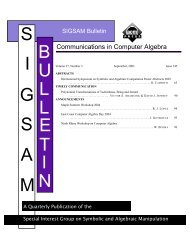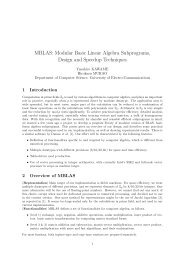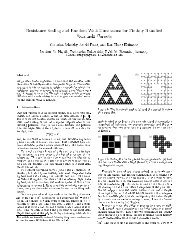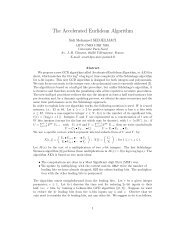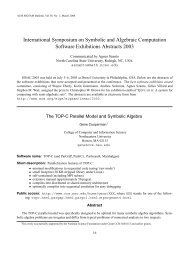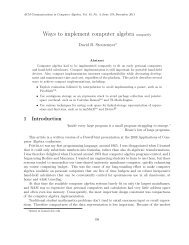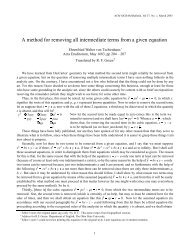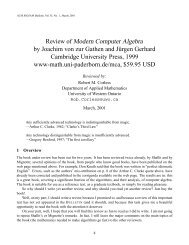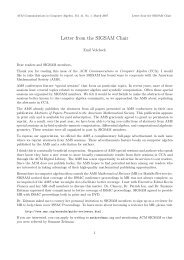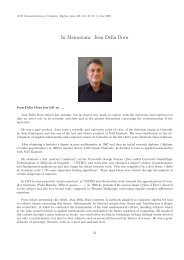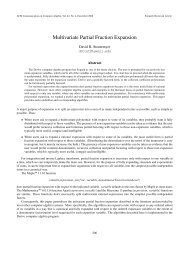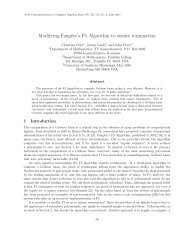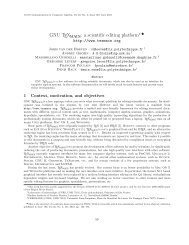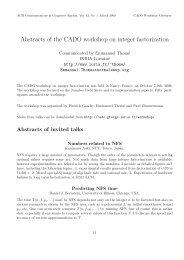Symbolic definite (and indefinite) integration: methods ... - SIGSAM
Symbolic definite (and indefinite) integration: methods ... - SIGSAM
Symbolic definite (and indefinite) integration: methods ... - SIGSAM
Create successful ePaper yourself
Turn your PDF publications into a flip-book with our unique Google optimized e-Paper software.
<strong>Symbolic</strong> <strong>integration</strong>: <strong>methods</strong> <strong>and</strong> open issues<br />
a flood of messages. Even worse, we would lose many integrals. The reason is that summ<strong>and</strong>s can<br />
separately spawn conflicting conditions, <strong>and</strong> this can happen in cases when they should instead<br />
cancel singularities in pairs.<br />
Here are some simple examples that may help to give an idea of the difficulties lurking within<br />
convergence assessment. Mathematica will evaluate them correctly but this was not always the case.<br />
∫ ∞<br />
Cos[x 2 ]<br />
0<br />
Log[x]<br />
dx<br />
Integrate::idiv : Integral of Cos[x2 ]<br />
Log[x]<br />
∫ ∞<br />
0<br />
∫ ∞<br />
If<br />
Cos[x 2 ]<br />
Log[x]<br />
dx<br />
e x Sech[ax]x dx<br />
0<br />
[<br />
Re[a] > 1, −PolyGamma[1, 3 4 − 1<br />
does not converge on {0, ∞}.<br />
4a]+PolyGamma[1, −1+a<br />
4a ]<br />
,<br />
8a 2<br />
Integrate [e x xSech[ax], {x, 0, ∞}, Assumptions → Re[a] ≤ 1]]<br />
The first diverges, but not due to problems at either endpoint (there is a pole at 1). The second<br />
converges conditionally, <strong>and</strong> version 4 of Mathematica even knows this, but then gets the condition<br />
wrong.<br />
Below is an example that gives an idea of what is involved in sorting out conditions for convergence.<br />
We need to look at possibilities of oscillatory, exponentially growing, <strong>and</strong> exponentially<br />
damped factors in order to figure out the correct conditions on parameters. In this case the original<br />
assumption suffices to guarantee convergence.<br />
[ ]<br />
Integrate Sin[βr]Sin[γr]<br />
, {r, −∞, ∞}, Assumptions → Re[α] > 0<br />
e αr2<br />
!<br />
e − (β−γ)2<br />
4α −e − (β+γ)2 √π<br />
4α<br />
2 √ α<br />
Here is a slightly more difficult variant, one that requires nontrivial conditions on parameters<br />
beyond what is given in the assumptions option.<br />
Integrate[(Sin[β ∗ r ∧ 2] ∗ Sin[γ ∗ r ∧ 2])/E ∧ (α ∗ r ∧ 2), {r, −Infinity, Infinity},<br />
Assumptions → Re[α] > 0]<br />
ConditionalExpression[<br />
( ( √π ( ) [<br />
3/4<br />
[√ ]]<br />
α α 2 +(β+γ) 2<br />
α Cos<br />
3<br />
ArcTan (β−γ) 2<br />
−<br />
2 2 α<br />
( ) [<br />
3/4<br />
[√ ]]<br />
α α 2 +(β−γ) 2<br />
α Cos<br />
3<br />
ArcTan (β+γ) 2<br />
+<br />
2 2 α<br />
√ ( ) [ 3/4<br />
[√ ]]<br />
(β − γ)<br />
2 α 2 +(β+γ) 2<br />
α Sin<br />
3<br />
ArcTan (β−γ) 2<br />
−<br />
2 2 α<br />
( ) [<br />
3/4 α<br />
√<br />
[√ ]]))/<br />
2 +(β−γ) 2<br />
α (β +<br />
3<br />
2<br />
γ)2 Sin ArcTan (β+γ) 2<br />
2 α<br />
( ( ) 3/4 ( ) )<br />
]<br />
3/4<br />
2α 3/2 α 2 +(β−γ) 2 α 2 +(β+γ) 2<br />
, Re[α] ≥ Abs[Im[β]] + Abs[Im[γ]]<br />
α 2 α 2<br />
10



